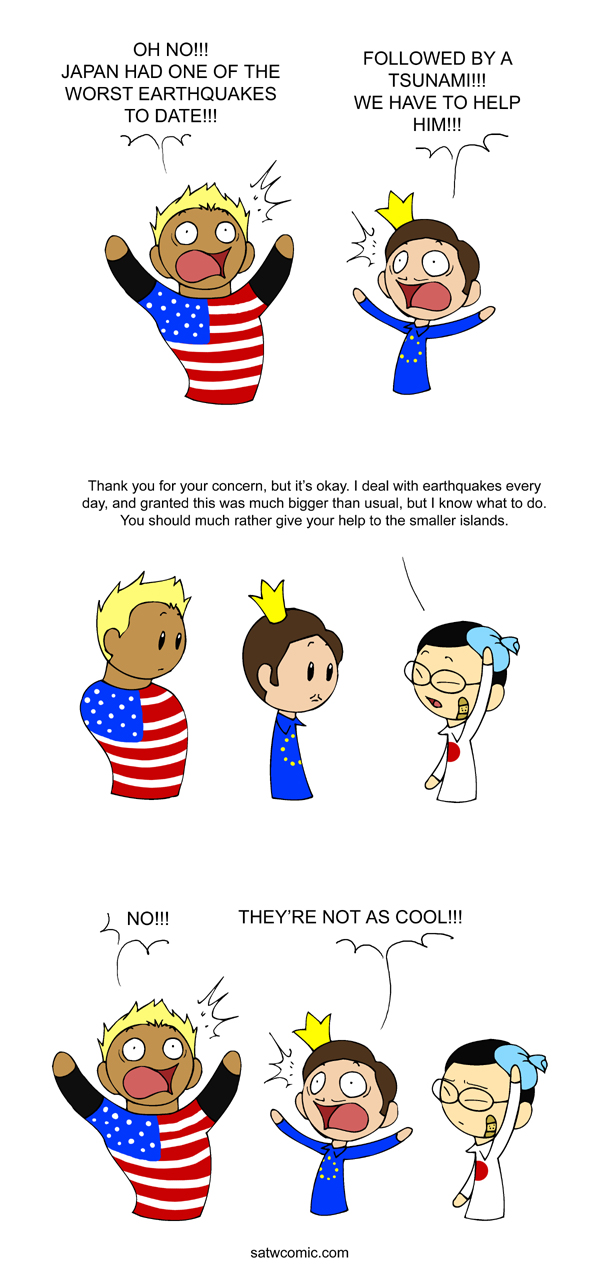 (A little late on this one) Who’s happy about the aid relief efforts trying to go to Japan? Remarkably few people in aid, that’s who.
(A little late on this one) Who’s happy about the aid relief efforts trying to go to Japan? Remarkably few people in aid, that’s who.Tales from the Hood isn’t happy:
Humanitarian aid is not broken so much as it has been prostituted. Despite the good that truly does get accomplished, accomplishing good is increasingly a back room function, a by-product of the industry’s core purpose which increasingly appears to be revenue-generation. … Real humanitarian need, for all practical purposes [are] being ignored. “We can’t raise money for conflicts”, say the marketing departments. And yet the good-hearted people of America have become convinced that the country which gives us Toyota, Nikon, Playstation III, that came very close to kicking our asses in WWII, and that almost owns us economically as it is, is somehow in dire need of our $10 donations (and apparently socks).Aid Watch isn’t happy (I know. “When is it?” You quip):
The Japanese are world-renowned experts in disaster preparedness, relief and recovery, and Japan is the third largest economy in the world. There should be no mistake that the Japanese government and Japanese organizations are well-equipped to take the lead.The Poverty News Blog isn’t unhappy, but is bemused:
Many critics say there is no need to give money to Japan because they are rich and becuase they are not asking for help. Yet, what we find funny about the whole debate, is that we don't recall similar things being said after Hurricane Katrina hit the US Gulf Coast. Fund-raising for that disaster went through the roof, despite the US being the richest nation in the world.Only the Onion, it seems, can be happy:
Following the recent earthquake and tsunami that tragically took the lives of an estimated 20,000 Japanese citizens, the planet Earth was afforded a good 15 minutes during which its inhabitants behaved like actual human beings, sources reported.Though even here, there is still room for skepticism:
… "Though its duration was incredibly brief, in this span of time the entire human race was able to temporarily forget all its petty political interests, narcissism, greed, and ironic detachment for a few moments and behave like real people with compassion and respect," social scientist Dr. Robert Westbrook said of the short-lived burst of basic decency. "There is no evidence of any significant bickering, lying, preening, or self-involvement during this period. In fact, it appears that all 6.7 billion human beings simply stopped for one quarter of an hour, became filled with genuine emotion, and said, 'Oh, no, those poor people,' while keeping their baser instincts in check."
"Frankly, I reject this notion that it takes tragic events like [the earthquake] for the people of Earth to act like real human beings for once," MIT sociology professor Samuel Lark told reporters. "After all, most modern research suggests that acting like a callous, unfeeling, vain [homo-economicus] is exactly what being a human being is."WHO on people overreacting to radiation warnings Bottom line: don’t take potassium iodide unless you are specifically directed by public health authorities and definitely don’t take large amounts (tablespoons) of iodized table salt.
And here is a recent, lengthy working paper on the role of social safety nets both before and after disasters. (Pelham, Clay, and Braunholz (2011) “Natural disasters: What is the Role for Social Safety Nets?” World Bank Social Protection and Labor Discussion Paper 1102.)
Not Aid Thoughts.. not Aid Thoughts...
ReplyDeleteBegging your pardon. Not Aid Thoughts.
ReplyDelete